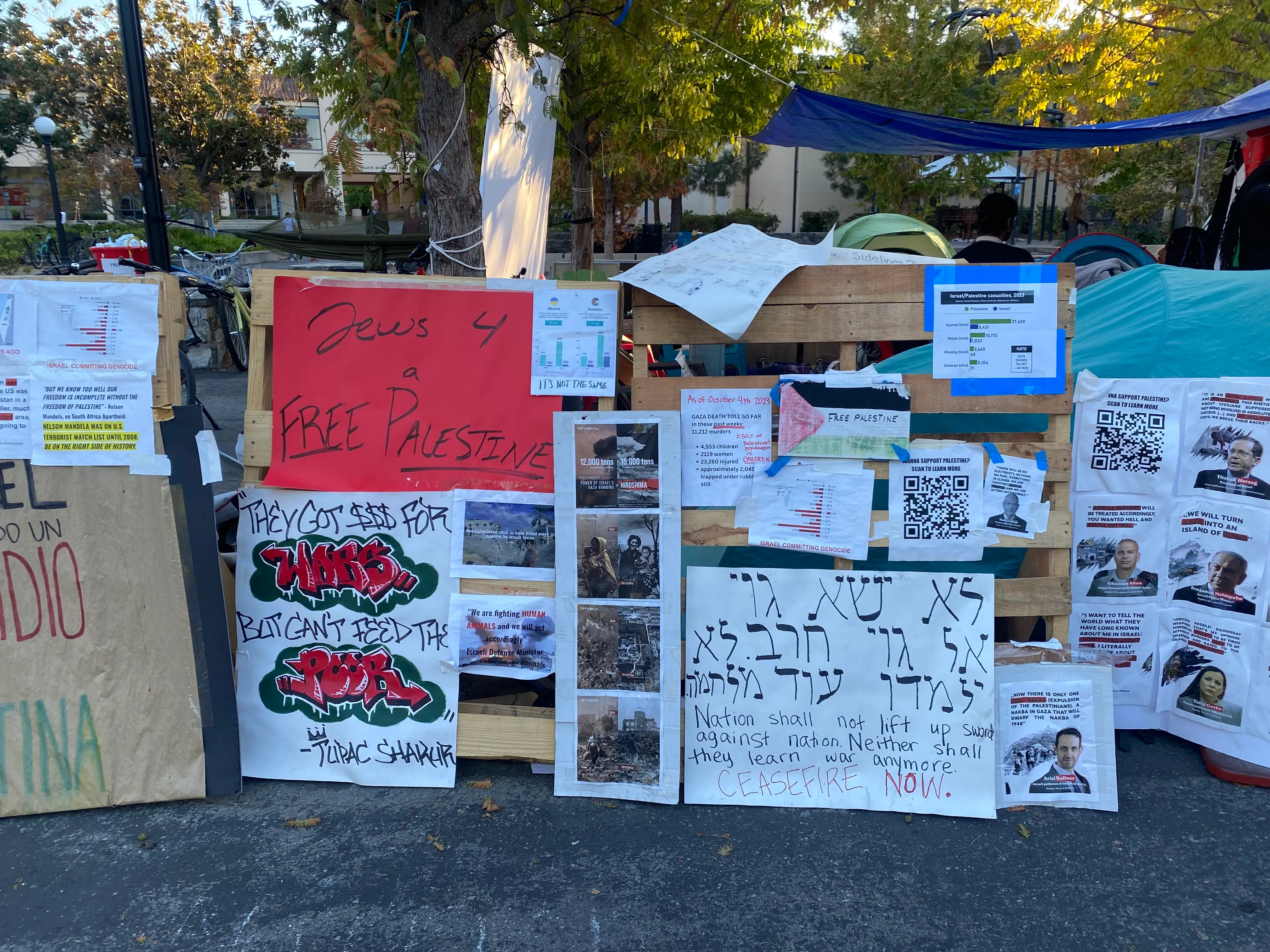Demonstrators with the “Sit-In to Stop Genocide” in White Plaza met with President Richard Saller and Provost Jenny Martinez Wednesday to discuss their demands, calling on the University to divest from and boycott Israeli ventures and academic institutions as well as issue a statement that condemns Israeli war crimes and calls for a ceasefire. The sit-in will continue over winter break as participants seek more action from the University.
Participants of the sit-in previously said that until a meeting with Saller and Martinez was granted, they were prepared to stay in White Plaza for “as long as it takes” to make progress on their demands. The University had previously refused to meet with representatives of the sit-in until the overnight portion ended.
Under pressure from alumni and student groups, including the sit-in, Saller and Martinez announced two new committees on Nov. 13 that are tasked with providing recommendations on ways to educate the community about and mitigate acts of Islamophobia and antisemitism.
Following the committees’ announcement and the recent meeting with administrators, protesters at the sit-in have since focused on divestment and other ways the University can support Palestinian thought and representation beyond resources for students. This includes advocating for the establishment of an Arab Studies track within the comparative studies in race and ethnicity program.
At the meeting with Saller and Martinez, members of the sit-in asked the administration to join them in calling on the Board of Trustees to divest from companies “enabling Israeli violence in occupied Palestine,” said Farah Tantawy ’26, a participant and organizer with the sit-in.
“The University asserts that their sole obligation amid the genocide in Gaza is ensuring student safety on campus. While this is crucial, they must also confront their active involvement in enabling Israel’s violence through research, investments and rhetoric,” said Katie Eder ’24, another participant and organizer with the sit-in. “The sit-in will persist until tangible measures are taken to acknowledge and rectify their complicity.”
According to Eder, Stanford funds companies “actively contributing to the genocide of Palestinians in Gaza and the West Bank,” including aerospace and defense contractor Lockheed Martin, which provides fighter jets and other military equipment to the Israeli military.
Saller and Martinez met with sit-in participants as part of broader engagement with “many different groups, including meetings with Jewish students and with Palestinian students and their allies,” wrote University spokesperson Mara Vandlik in a statement to The Daily.
“The University is continuing to work to support the safety and wellbeing of everyone in our community as the Israel-Hamas war continues,” Vandlik wrote.
Though the sit-in and the University have opened dialogue, the group plans on continuing their protest throughout winter break.
Tantawy said the meeting with Saller and Martinez was “just the first step into creating institutional change at Stanford.”
Echoing Tantawy, Eder said that they are “continuing the sit-in to ensure that what’s happening in Gaza is visible to the Stanford community and Stanford administration. We’ll continue to be visible and be disruptive until we see action from the administration.”
To ensure the success of the sit-in over break, the group plans to rely on graduate students, whose student housing does not close over break.
Over winter break, the sit-in is slated to become the longest sit-in in Stanford history, beating a 53-day-long sit-in calling on the University to divest from apartheid South Africa in 1985.
Organizers with the sit-in are drawing on past successful student divestment campaigns, including ones that called on the University to divest from Sudanese ventures supporting the genocide in Darfur, coal mining initiatives and ventures that supported and contributed to South African apartheid.
In previous student protest moments, “the push for divestment, the threat of actual economic consequences is what led to the fall of the apartheid regime and its replacement with a democratic regime,” said Hana Spahia ’26, another sit-in organizer.
The sit-in’s demands are not new — students have been calling on the University to divest from Israeli ventures since 2015, when a coalition of student activist groups named Stanford Out of Occupied Palestine (SOOP) petitioned the University to divest. SOOP successfully campaigned for the Undergraduate Senate to vote in favor of divestment after a petition garnered over 1,000 student signatures.
According to Spahia, the University has a moral imperative to divest: ”The Board of Trustees’ Document for Investment Responsibility says explicitly that divestment must be considered in cases of apartheid and genocide,” Spahia said.
“Being here for winter break represents the fact that we’re willing to fight the fight even when it’s not convenient,” Tantawy said. “Our presence on campus is meant to be a disturbance. It’s meant to make sure that people know business cannot go on as usual.”
